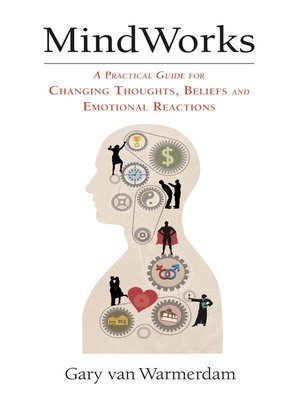MindWorks
ebook ∣ A Practical Guide for Changing Thoughts, Beliefs and Emotional Reactions
By Gary van Warmerdam

Sign up to save your library
With an OverDrive account, you can save your favorite libraries for at-a-glance information about availability. Find out more about OverDrive accounts.
Find this title in Libby, the library reading app by OverDrive.



Search for a digital library with this title
Title found at these libraries:
| Loading... |
Why do we generate thoughts and emotional reactions which drive us to sabotaging behaviors and emotional drama? Making life altering changes requires more than just telling yourself to think happy thoughts. Learning to understand and shift your point of view, your beliefs and even your language, can end much of the emotional suffering you create for yourself and in relationships.
MindWorks offers a simple guide for understanding the complexities of your mind's inner workings and a step by step practice to facilitate change. Whether your transformation is large or small, you will surely look at yourself and the world in a completely new way.
As humans we live in two worlds. The first is the external, physical world of family, friends, work, and environment. The second is the internal world of our mind, imagination, thoughts, emotions, and beliefs: an inner world that can feel just as real to us as the first one. This book is about that second world and how to change what happens there.These two worlds aren't separate—they impact each other all the time. In particular, our internal world invisibly influences how we experience and relate to the external world around us. Our overactive mind, driven by our beliefs, can sabotage our relationships and our attempts at happiness while tempting us to point the finger at everyone else. Our beliefs and thoughts can also convince us that we are somehow lacking, that we don't deserve happiness and success, or that we are essentially failures. The result is a lot of unnecessary, unpleasant emotional reactions and unhappiness.
As children we were naturally happy. As we grew up, our perceptions and experience became conditioned by the values, beliefs, and emotional patterns we absorbed from those around us. We learned to please others and sought approval from them; when we got it, we felt loved and accepted. We also learned to fear their criticism and to feel hurt by it.
Over the years we developed our own thoughts and beliefs about our self-worth and value, and we adopted behavior patterns accordingly. We created our own emotions and emotional reactions based on our own beliefs. If we succeeded or won we felt good about ourselves; if we failed we automatically felt bad about ourselves. We developed a part of our mind to constantly assess ourselves and find ourselves good enough or not good enough throughout the day. Our mind ran automatically with opinions, thinking, and emotional responses whether we wanted it to or not. If we want to live in happiness that is sustainable, we will have to take steps to free ourselves from these automatic thought patterns and emotional reactions.
This book offers clear explanations and several practices to help you change how your mind works. Once developed, you can apply these skills to any situation for the rest of your life. Within these pages you will find and understand in a commonsense way:






